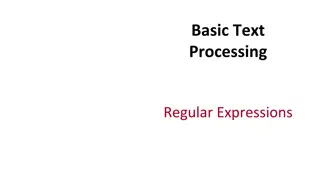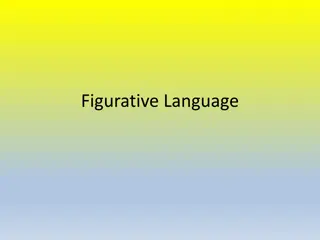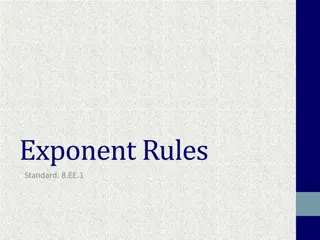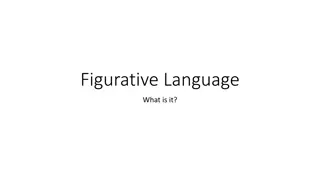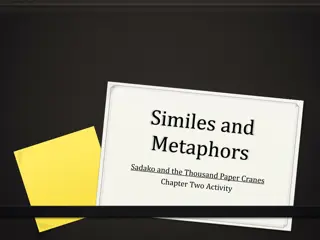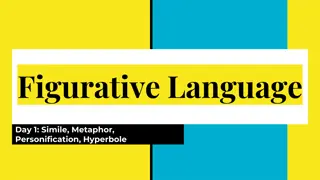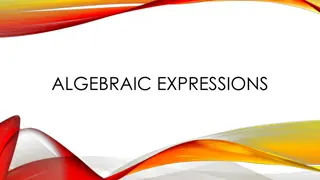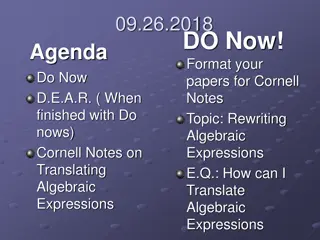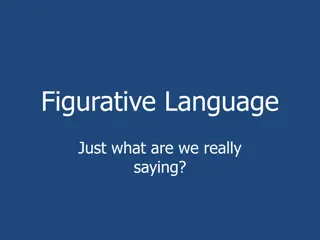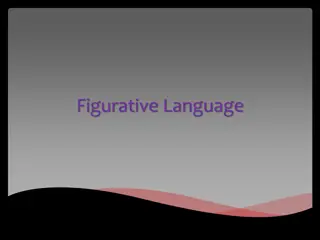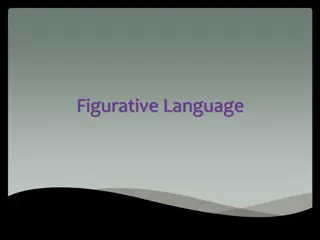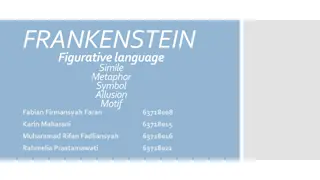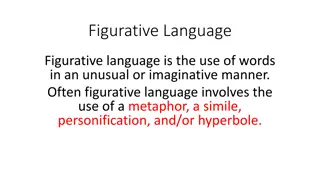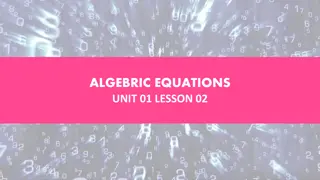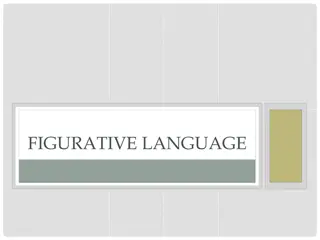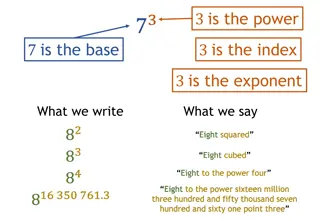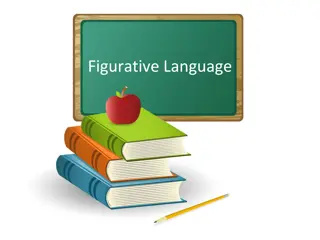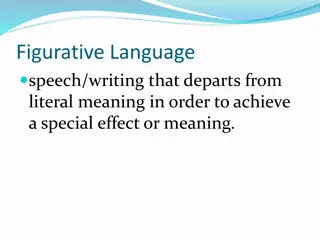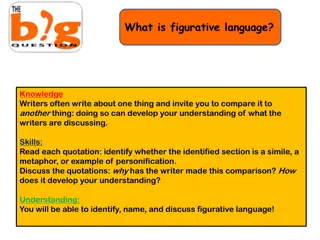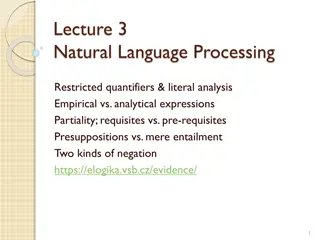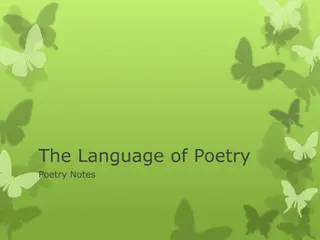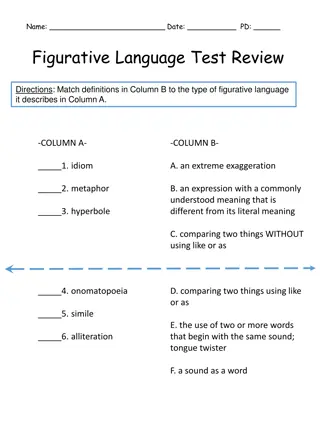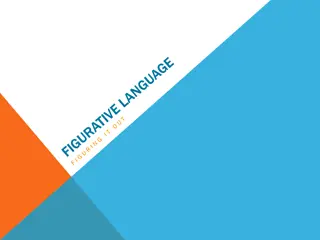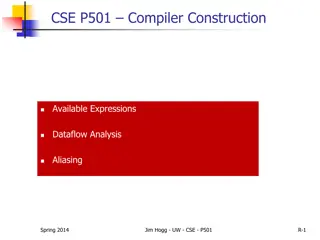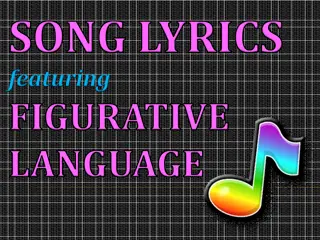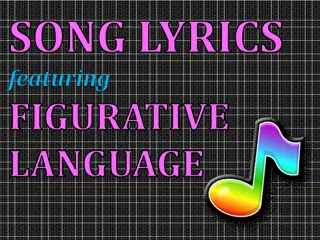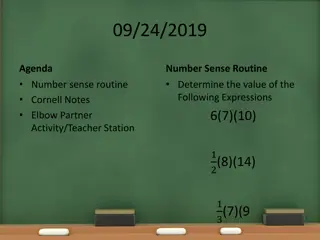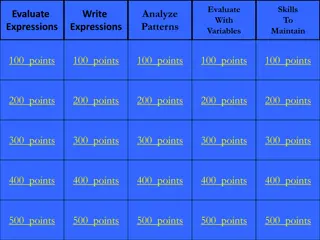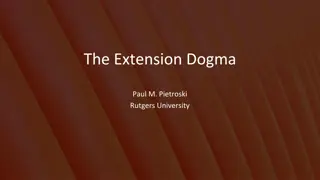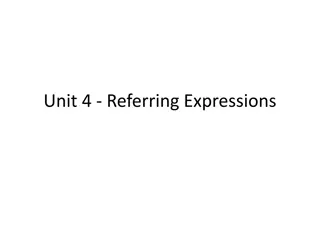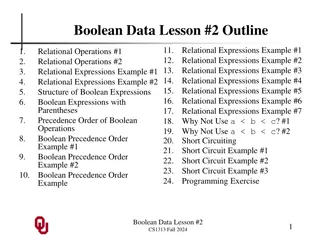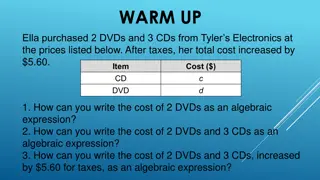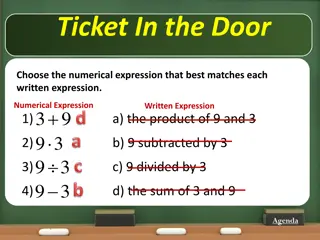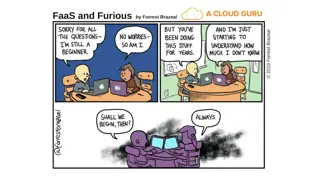Understanding Regular Expressions for Text Processing
Regular expressions provide a powerful way to search for and manipulate text strings by specifying patterns. This content explores different aspects of regular expressions, including disjunctions, negations, more disjunctions, optional characters, anchors, and examples. By learning how to use regula
2 views • 46 slides
Exploring Figurative Language: Hyperbole, Simile, Metaphor, Personification, Idiom, and Pun
Delve into the world of figurative language with examples of hyperbole, simile, metaphor, personification, idiom, and pun. Understand the art of exaggeration in hyperbole, the comparison of two objects in simile, the direct comparison in metaphor, giving human qualities to non-human entities in pers
1 views • 22 slides
Understanding Exponents and Rules
Exponents are a shortcut for repeated multiplication. Learn how to write expressions using exponents, evaluate expressions containing exponents, and apply rules for dealing with exponents. Explore examples and see how to write expressions in exponential form, evaluate them using calculators, and sim
2 views • 32 slides
Understanding Figurative Language Through Examples
Explore various examples of figurative language such as personification, idioms, similes, metaphors, hyperboles, onomatopoeia, and alliteration. Analyze each example and categorize them correctly in the provided grid to enhance your understanding of figurative language.
0 views • 7 slides
Understanding Figurative Language: Similes and Metaphors
Figurative language, like similes and metaphors, adds depth and creativity to writing. Similes use "like" or "as" to make comparisons, while metaphors directly state one thing is another. Through examples and imagery, the power of these literary devices is showcased, helping readers visualize and in
1 views • 6 slides
Exploring Figurative Language: Simile, Metaphor, Personification, Hyperbole
Figurative language enhances descriptions by comparing elements to create vivid imagery. This presentation explores simile, metaphor, personification, and hyperbole, providing examples and explanations for each. Similes use "like" or "as" to draw comparisons, while metaphors state facts metaphorical
0 views • 6 slides
Ustad Allah Bux - Pioneer of Modern Landscape Painting in Pakistan
Ustad Allah Bux, also known as Allah Baksh, was a renowned Pakistani painter who excelled in expressing folklore and pastoral life of Punjab through his artwork. He established himself as a master of modern landscape and figurative painting, drawing inspiration from Western styles and incorporating
1 views • 17 slides
Understanding Algebraic Expressions: Variables, Coefficients, and Constants
Explore the difference between numeric and algebraic expressions, learn about the components of algebraic expressions - variables, coefficients, and constants. Discover how to identify variables, coefficients, and constants in expressions. Classify algebraic expressions as monomials, binomials, or t
0 views • 20 slides
Mastering Algebraic Expressions: Translating Words to Equations
Learn how to translate word phrases into algebraic expressions for addition, subtraction, multiplication, and division. Understand the key phrases associated with each operation to write expressions accurately. Enhance your skills in rewriting algebraic expressions with practical examples and concis
4 views • 17 slides
Exploring Figurative Language in Literature
Delve into the world of figurative language with an overview of alliteration, allusion, antithesis, cliché, colloquialism, connotation, denotation, and euphemism. Understand how these literary devices enhance writing through examples and explanations. Discover how poets use alliteration to create a
0 views • 24 slides
Exploring Figurative Language in Literature
Figurative language adds depth and imagery to writing by using words or expressions in a non-literal way. Common examples include simile, metaphor, personification, onomatopoeia, hyperbole, and symbolism. Similes compare two unlike things using "like" or "as," while metaphors directly equate them. P
0 views • 8 slides
Understanding Figurative Language in Literature
Figurative language adds depth and creativity to writing by using words in ways beyond their literal meanings. Examples include metaphors, similes, alliteration, and hyperbole. Poetry often employs figurative language to evoke sensory experiences and emotions. Allusions and idioms are also common fo
0 views • 32 slides
Understanding Figurative Language in Writing
Explore the world of figurative language in writing, where words go beyond their literal meanings to create vivid imagery and evoke emotions. Learn about different types of figurative language like alliteration, hyperbole, and idioms, and how they enhance the beauty and depth of poetry and prose.
0 views • 31 slides
Understanding Figurative Language in Frankenstein
Figurative language in Frankenstein plays a crucial role in conveying deeper meanings and creating vivid imagery. Similes and metaphors are used to draw comparisons between characters and objects, adding layers of complexity to the narrative. Through examples like comparing Elizabeth's soul to a shr
2 views • 15 slides
Exploring Figurative Language: Metaphors, Similes, Hyperboles, and Personification
Figurative language enhances communication by using imaginative expressions like metaphors, similes, hyperboles, and personification. Metaphors compare two things directly, similes use "like" or "as," hyperboles exaggerate, and personification attributes human traits to non-human entities.
0 views • 5 slides
Understanding Algebraic Expressions and Exponents
Master the basics of algebraic expressions, simplification, and exponent rules in this lesson. Learn to interpret word problems into algebraic expressions, apply properties of real numbers, and solve algebraic problems step by step. Practice evaluating expressions, simplifying equations, and underst
0 views • 13 slides
Understanding Figurative Language: A Guide to Metaphors, Similes, and More
Figurative language is a powerful tool used by writers to evoke emotions and create vivid imagery in the minds of readers. It goes beyond literal meanings, allowing for deeper interpretations and connections with the subject matter. This guide explains the difference between figurative and literal l
0 views • 40 slides
Exploring Figurative Language in Writing
Figurative language enhances writing by creating visual imagery and deeper meaning. Understanding its use improves reading comprehension, plot analysis, and character motivation recognition. Through examples like similes, metaphors, personification, and idioms, readers can grasp the nuances of figur
0 views • 9 slides
Numerical Expressions and Exponents Overview
This content covers various numerical expressions involving exponents, including examples of valid and invalid mathematical representations, matching worded expressions with their numerical equivalents, and identifying the correct expressions based on provided criteria.
0 views • 30 slides
Figurative Language Quiz: Test Your Knowledge!
Put your knowledge of figurative language to the test with this quiz. Identify popular figurative language terms such as hyperbole, simile, metaphor, alliteration, and onomatopoeia for different point values. Challenge yourself and enhance your understanding of figurative language through this inter
0 views • 75 slides
Exploring Figurative Language in "The House on Mango Street
Dive into the world of figurative language in Sandra Cisneros' novel "The House on Mango Street" by exploring examples of imagery, metaphor, simile, personification, hyperbole, alliteration, assonance, and consonance. Discover how these literary devices enhance the storytelling by painting vivid pic
0 views • 11 slides
Understanding Figurative Language Through Quotations
Explore the concept of figurative language by analyzing quotations that demonstrate similes, metaphors, and personification. Discover how writers use comparisons to enhance meaning and develop a deeper understanding of literary texts.
0 views • 43 slides
Understanding Empirical vs Analytical Expressions in Natural Language Processing
Restricted quantifiers and literal analysis in natural language processing reveal the distinctions between empirical and analytical expressions. While empirical expressions refer to non-trivial intensions that require empirical investigation, analytical expressions denote constant intensions that ca
1 views • 19 slides
Exploring the Language of Poetry - Figurative Expressions Unveiled
Delve into the enchanting realm of poetry where figurative language reigns supreme. Discover the beauty of similes, metaphors, extended metaphors, hyperboles, personifications, and more, as they weave intricate tapestries of imagery and emotion in poetic compositions. Unravel the depth and power of
0 views • 24 slides
The Hobbit Study Guide: Character Traits, Figurative Language, and Sentence Structures
Explore the character traits of Bilbo Baggins and the dwarves, delve into figurative language examples, and learn about sentence structures in "The Hobbit" through this comprehensive study guide for an upcoming test.
0 views • 7 slides
Figurative Language Test Review and Practice
Review and practice identifying various types of figurative language such as simile, metaphor, hyperbole, personification, and more through matching exercises, multiple-choice questions, and sentence explanations. Enhance your understanding of figurative language with this interactive test review.
0 views • 4 slides
Understanding Figurative and Literal Language in English
This comprehensive guide explains the concepts of figurative and literal language, with examples of similes, metaphors, personification, hyperbole, and understatement. Learn how these devices add depth and creativity to writing.
0 views • 32 slides
Dataflow Analysis for Available Expressions in Compiler Construction
Utilizing dataflow analysis techniques, the concept of available expressions is discussed in the context of compiler construction. The goal is to identify common subexpressions that span basic blocks by calculating their availability at the beginning of each block. The process involves determining w
0 views • 59 slides
Understanding Figurative Language in Literature
Explore the world of figurative language through metaphors, similes, and personification with examples from literary works. Dive into the power of language to evoke imagery and emotions. Test your knowledge with a fun quiz included in the content.
1 views • 22 slides
Exploring Figurative Language in Popular Song Lyrics
Dive into the world of figurative language through popular song lyrics featuring various literary devices such as alliteration, simile, personification, hyperbole, onomatopoeia, and more. Explore how artists like Nickelback, Sean Kingston, Michael Jackson, Owl City, Ke$ha, and others creatively use
0 views • 38 slides
Figurative Language in Popular Song Lyrics
Explore the art of figurative language through iconic song lyrics. Delve into the world of similes, metaphors, personification, hyperboles, alliterations, onomatopoeias, and more used in songs by artists like Sean Kingston, Taylor Swift, Owl City, and Nickelback.
0 views • 37 slides
Understanding Rust Expressions and Declarations in System Software Development
Rust is an expression language where most things have values. Learn about Rust expressions, blocks, declarations, conditional expressions, multi-case expressions, and iteration expressions in system software development. Explore the execution semantics, syntax, and best practices for writing safe an
0 views • 8 slides
Algebraic Expressions Lesson Overview
This lesson focuses on writing and reading algebraic and written expressions with grouping symbols and less than. Students will learn how to translate expressions containing groupings and less than. The lesson is designed to build on the previous day's lesson and challenge students' thinking. It set
0 views • 25 slides
Expressions and Patterns Evaluation Practice
The content focuses on evaluating expressions with variables, analyzing patterns, and maintaining mathematical skills. It includes practice exercises such as inserting parentheses to alter expression values and identifying errors in calculations. Additionally, it presents scenarios where individuals
0 views • 53 slides
The Extension Dogma: Exploring Meaning and Extensions in Linguistic Expressions
The Extension Dogma challenges the assumption that linguistic expressions inherently possess meanings. Instead, it posits that expressions have extensions without necessary meanings that determine them. Theories of meaning should focus on the extensions of expressions, while psychological studies of
0 views • 30 slides
Understanding Referring Expressions in Linguistics
Explore the concept of referring expressions in linguistics with examples, quick quizzes, and explanations. Learn about expressions with variable and constant references, differences in referents, expressions with no reference, and the definition of reference. Discover how linguistic context plays a
0 views • 10 slides
Understanding Relational Operations for Boolean Expressions
Learn about relational operations in Boolean expressions through examples and explanations. Discover how to compare numeric operands to produce Boolean results, covering equal to, not equal to, less than, less than or equal to, greater than, and greater than or equal to operations. The content inclu
0 views • 25 slides
Understanding Algebraic Expressions: Terms, Factors, and Coefficients
When dealing with algebraic expressions, it's essential to grasp terms, factors, and coefficients. Expressions consist of numbers, operations, and variables, with terms being the building blocks separated by addition or subtraction signs. Factors are the components of each term that produce the give
0 views • 13 slides
Math Expressions Exploration for Elementary Students
This content discusses numerical and algebraic expressions, teaching students how to match written expressions to numerical expressions, understand the concept of variables, and differentiate between algebraic and numerical expressions. It also covers basic operations like addition, subtraction, mul
0 views • 11 slides
Understanding Basic Python Syntax and Expressions
Python programs manipulate values using expressions and statements. Programs work by evaluating expressions that result in values. The interpreter processes expressions to display their values, while statements direct the flow of the program. Python supports different data types such as integers, fl
0 views • 46 slides
